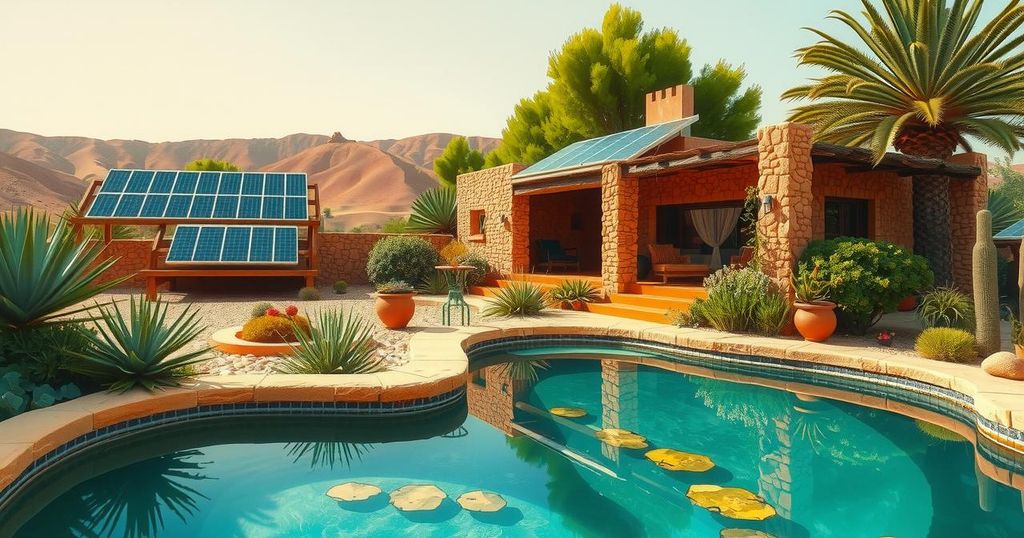As Tourism Soars in Morocco, Calls for Responsibility Grow

Morocco welcomed a record 17.4 million tourists in 2024, exceeding targets and generating significant revenue. Nevertheless, this tourism boom poses challenges, notably the destruction of local communities and environmental degradation. Calls for responsible tourism are growing, urging a sustainable approach to benefit both the economy and local populations.
The Kingdom of Morocco is experiencing an unprecedented tourism boom, welcoming a record 17.4 million visitors in 2024. This figure dramatically exceeds the ambitious target set for 2026, as reported by the Ministry of Tourism. The surge has generated a staggering revenue of 112.5 billion dirhams, indicating a 7.5% increase from the previous year. However, while tourism bolsters the economy—employing 827,000 individuals and creating 25,000 new jobs—it raises significant questions about its sustainability and the long-term impact on local communities and the environment.
There is a darker side to this tourism growth, visible in the demolition of entire Amazigh (Berber) villages to pave the way for luxury resorts. Just last year, in Tifnit, residents received a mere five days’ notice to leave as bulldozers rolled in. The same fate befell Imsouane, a famed surf destination, where an entire village was cleared in a single day, displacing over a thousand people. “When the state takes away their land, it strikes at one of the core pillars of Amazigh identity: living on and from their land,” said journalist Siham Azeroual, highlighting the cultural implications.
The government’s plan for tourism expansion includes developing fifteen new tourist zones in Greater Agadir and establishing an extensive “Blue Safari” route linking Agadir to various sites in Souss Massa National Park. Tourism entrepreneur, Said Marghadi, who has advocated for sustainable practices for years, voices his growing concerns about this rapid expansion. He pointed out that Morocco’s fixation on increasing visitor numbers does not equate to meaningful benefits for local areas. “What’s the point of increasing arrivals if the money doesn’t benefit the regions in a sustainable way?” he asks.
Environmental concerns are equally worrisome, as mass tourism contributes significantly to climate change. According to France’s Ministry for Ecological Transition, the sector is responsible for nearly 5% of global greenhouse gas emissions, with Morocco facing its own climate-related challenges—shrinking water supplies and declining harvests, to name a few. The irony lies in the fact that while local communities struggle with water scarcity, many hotels continue to run air conditioning without pause. Marghadi warns that such practices exacerbate environmental issues. “Mass tourism accelerates climate change,” he asserts.
Amid these challenges, a shift toward responsible tourism is gaining traction. The UN World Tourism Organization defines responsible tourism as one that fully considers its economic, social, and environmental impacts. This model encourages sustainability and respect for local communities, something Marghadi embraced in 2008 with the establishment of his ecolodge using sustainable methods and local materials. His lodge features a natural pool and operates on solar energy.
However, Marghadi insists that true sustainability goes beyond just building eco-friendly infrastructure. “Responsible tourism isn’t a checklist—it’s about coherence between the environment, social responsibility, and community engagement,” he explains. He also started an agricultural cooperative to create local products, aiding in the region’s food self-sufficiency.
What really distinguishes Marghadi’s strategy is his focus on engaging visitors. He encourages guests to participate actively, from picking fruit to making jam, turning their visits into shared experiences. His belief is that genuine, authentic encounters foster deeper appreciation and understanding. “A tourist who has an authentic experience becomes a far more powerful ambassador than any advertising campaign,” he says.
Furthermore, Marghadi emphasizes the importance of education over lecturing. Guests learn to conserve resources like electricity and water through hands-on activities, fostering a culture of responsibility. He states, “If our ecosystems collapse, we’ll be the first to suffer. The tourists will simply go elsewhere. Education must be subtle. Overdoing it ruins the message. You have to touch people through experience—through beauty.”
Training his staff on environmental issues is also a priority, as Marghadi believes that learning from others can inform local practices. Despite challenges like the lack of a formal certification process for responsible tourism in Morocco, which leaves the door open for misleading claims, he remains optimistic. “Being ecological is simple. No miracles needed. Just organization, discipline, and respect,” he asserts. He envisions grassroots change, one person at a time, indicating that perhaps transformative change in sustainable tourism can come from collaboration and community.
Morocco’s tourism sector has surged impressively in recent times, raising significant economic benefits. However, this growth comes at a cost, notably affecting local communities and the environment. The destruction of villages and the environmental toll of mass tourism have prompted calls for more responsible, sustainable practices. Entrepreneurs like Said Marghadi advocate for a tourism model that prioritizes economic, social, and ecological factors, engaging tourists in meaningful ways. The future of Moroccan tourism may hinge on striking a balance between growth and responsibility, ensuring that local voices are heard in the ongoing narrative of development.
Original Source: en.yabiladi.com






